Unit 4 Natural disasters Vocabulary课件(牛津深圳版九年级下册)
文档属性
| 名称 | Unit 4 Natural disasters Vocabulary课件(牛津深圳版九年级下册) |
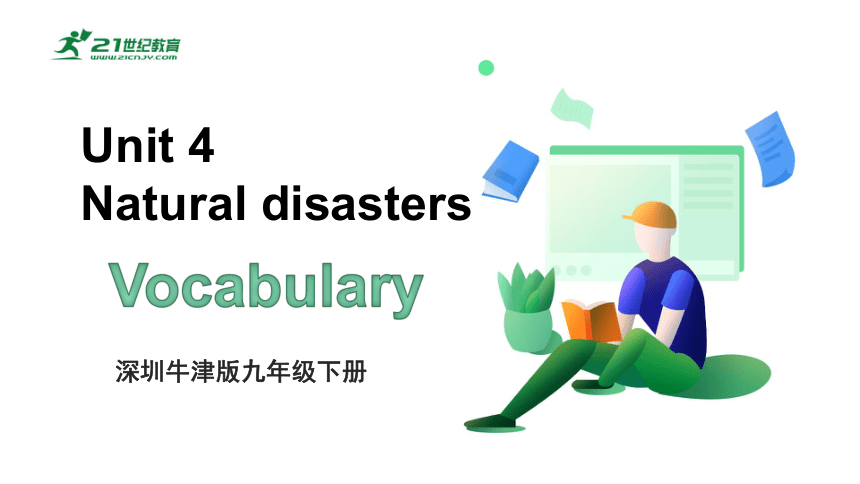
|
|
| 格式 | pptx | ||
| 文件大小 | 2.3MB | ||
| 资源类型 | 试卷 | ||
| 版本资源 | 牛津深圳版 | ||
| 科目 | 英语 | ||
| 更新时间 | 2024-02-27 00:00:00 | ||
图片预览

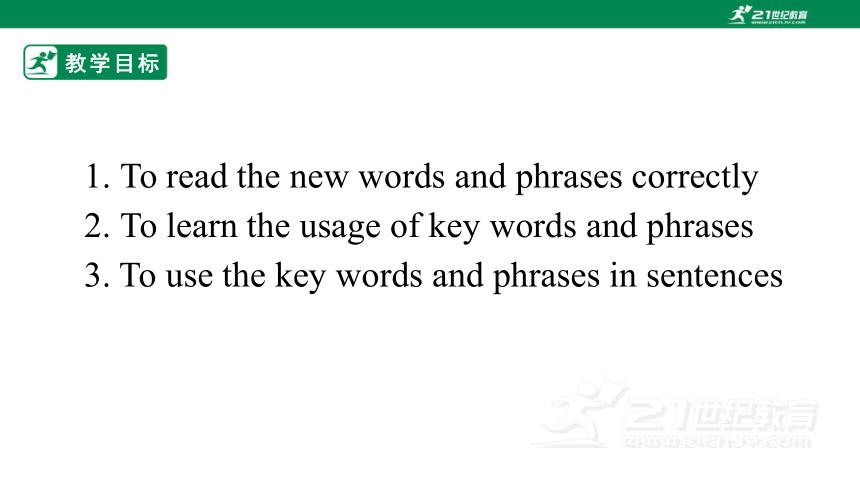
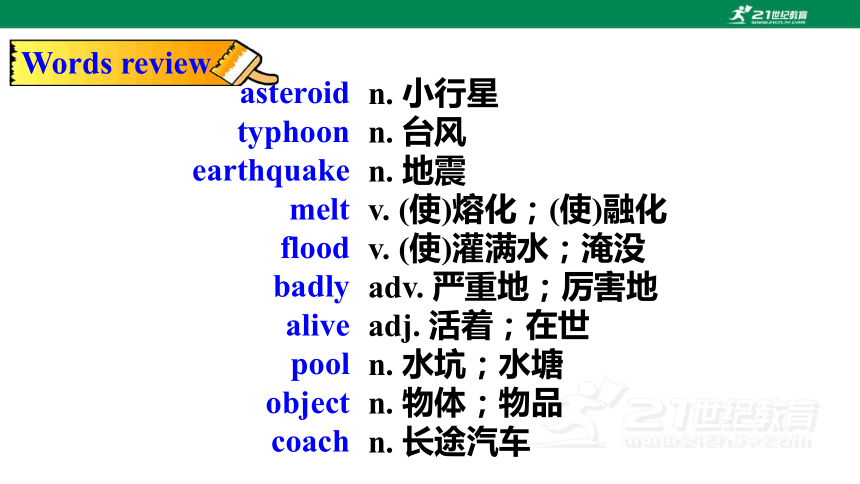
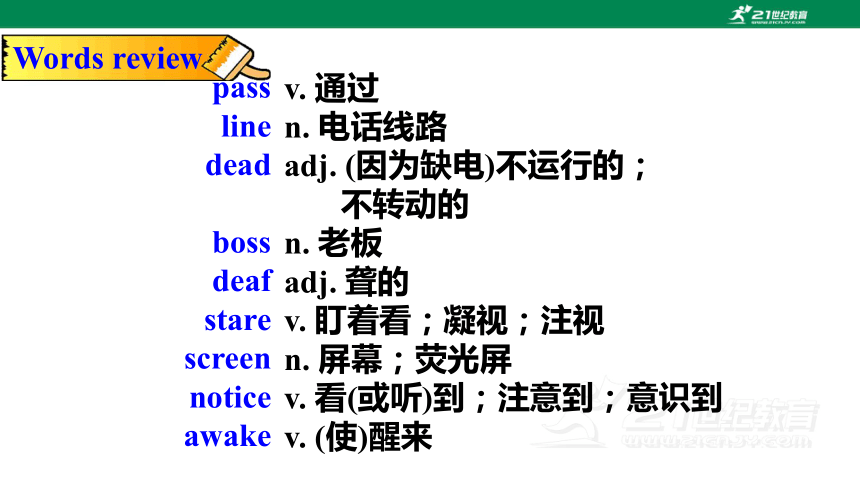
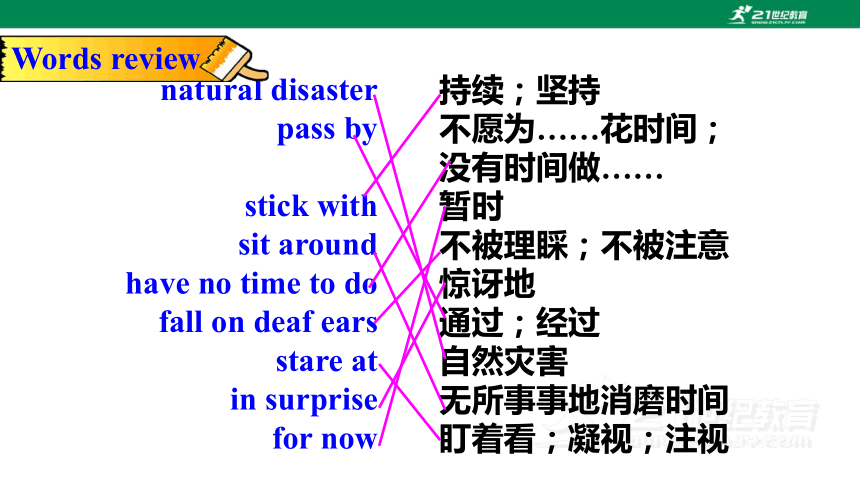
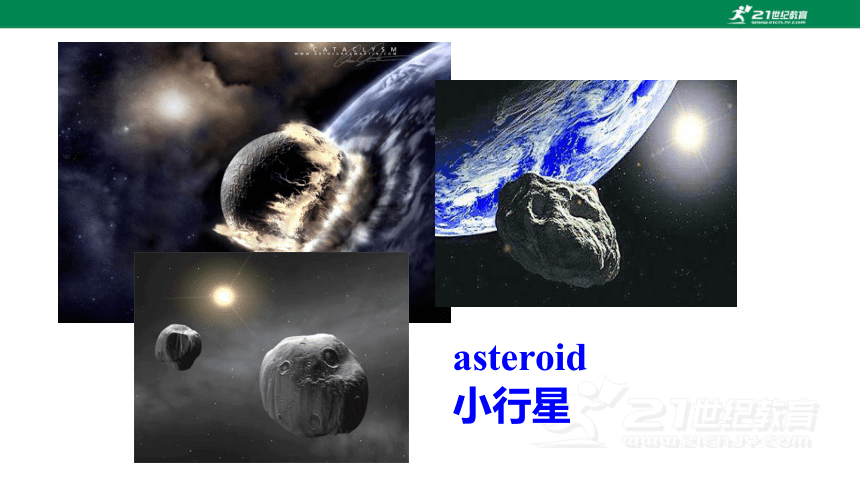
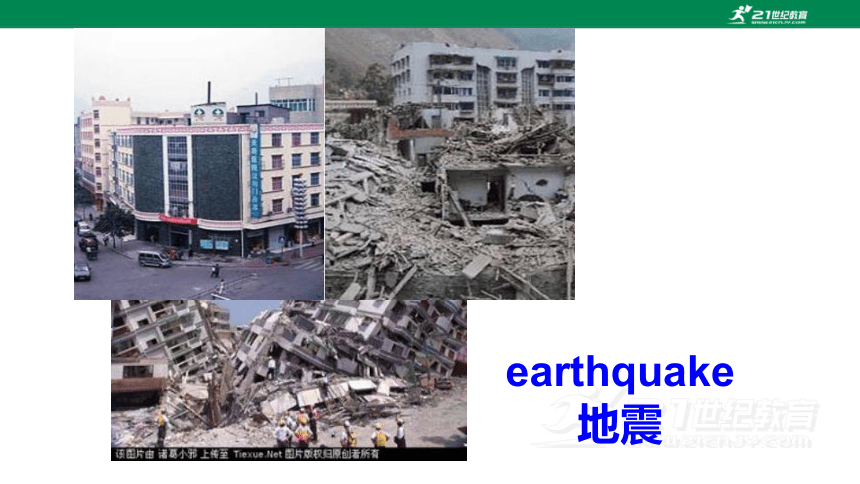
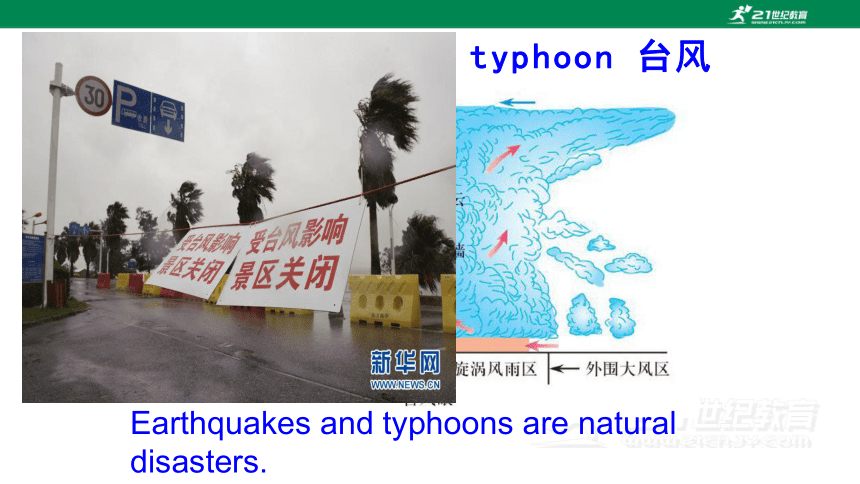

文档简介
(共29张PPT)
Unit 4
Natural disasters
深圳牛津版九年级下册
Vocabulary
教学目标
To read the new words and phrases correctly
To learn the usage of key words and phrases
3. To use the key words and phrases in sentences
asteroid
typhoon
earthquake
melt
flood
badly
alive
pool
object
coach
n. 小行星
n. 台风
n. 地震
v. (使)熔化;(使)融化
v. (使)灌满水;淹没
adv. 严重地;厉害地
adj. 活着;在世
n. 水坑;水塘
n. 物体;物品
n. 长途汽车
Words review
pass
line
dead
boss
deaf
stare
screen
notice
awake
v. 通过
n. 电话线路
adj. (因为缺电)不运行的;
不转动的
n. 老板
adj. 聋的
v. 盯着看;凝视;注视
n. 屏幕;荧光屏
v. 看(或听)到;注意到;意识到
v. (使)醒来
Words review
natural disaster
pass by
stick with
sit around
have no time to do
fall on deaf ears
stare at
in surprise
for now
持续;坚持
不愿为……花时间;没有时间做……
暂时
不被理睬;不被注意
惊讶地
通过;经过
自然灾害
无所事事地消磨时间
盯着看;凝视;注视
Words review
asteroid
小行星
earthquake
地震
Earthquakes and typhoons are natural
disasters.
typhoon 台风
coach 长途汽车
e.g. They are coaches.
survival kit 救生包
(装有食物,医疗用品和工具)
kit 成套工具,设备
pool 水塘
1.melt v. (使)融化;(使)熔化
e.g. The hot sun soon melted the ice.
炎热的阳光很快使冰融化了。
Spring is coming, the snow has melted.
春天来临,雪已经融化。
使心软化;使柔和
他因怜悯而心软了。
His heart melted with pity.
2. badly adv. 严重地,厉害地
e.g. The car has been badly damaged in the accident.
bad adj. 坏的,不好的
bad/badly - worse - worst
3. alive adj.活着,在世
living和alive的区别:
都有“活的,有生命的”之意。
①living一般只作定语,可以位于名词前,也可位于名词后。
如:living things等
②alive常作表语、后置定语等。
如:The fish is still alive.那条鱼还活着。
Who’s the greatest man alive
= Who’s the greatest living man
4. object n.物体,物品;目的,目标
Unidentified Flying Object (UFO)
e.g. Blind person can recognize objects by feeling them.
盲人常能凭触摸辨识物体。
5. pass v.通过,传递
e.g. Everyone in the class passed the maths exam.
数学考试班上人人都及格了。
pass by 经过,通过 = go past;(时间)流逝
pass away 去世
pass the time打发时间;消磨时光
pass on 传递;继续
6.stare v.盯着看,凝视
stare at sb./sth. 盯着某人/物看
e.g. It is impolite to stare at the strangers.
盯着陌生人看是不礼貌的。
7.notice v.看(或听)到;注意到;意识到(= realize) n.通知,公告
notice sb. doing sth. 注意到某人正做某事
notice sb. do sth. 注意到某人做了某事
e.g. I noticed her crying in the room.
我注意到她正在房里哭。
8. awake
①v.(使)醒来
awake – awoke –awoken
e.g. Then I awoke.
Her voice awoke the sleeping boy.
②adj. 醒着的
e.g. Is the baby awake or asleep
9.immediately adv.立即,马上
= at once = right now = right away
e.g. Mary answered the phone immediately.
immediate adj.迫切的,目前的,紧跟的
10.missing adj. 失踪的,找不到的
= lost
e.g. I never found my missing watch.
我一直没找到遗失的手表。
11. deaf adj.聋的
= not able to hear
12.line n.电话线路
dead adj. (因为缺电)不运行的,不转动的
e.g. I tried to call my father, but the line is dead.
13. stick with 持续,坚持; 紧跟,不离开某人(以便得到帮助)
stick to 坚持(做某事,不怕困难);固守,坚持保留
e.g. I decided to stick with my homework, while others were playing outside.
It is very difficult to stick to a diet.
14. have no time to do
不愿为……花时间;没有时间做……
e.g. I have no time to think about the flood.
15. fall on deaf ears 不被理睬,不被注意
e.g. But my cries fell on deaf ears.
16. in surprise 惊奇地,出乎意料地
= surprisingly
e.g. In surprise, people finally started to notice the flood.
令人惊奇地是,人们终于开始注意到洪水了。
17. for now 暂时
= at present = temporary
e.g. I was safe —— for now.
18. sit around 无所事事地消磨时间;闲坐
e.g. Several students just sit around in the classroom instead of studying.
Typhoon is one of the natural _________(disaster).
It’s been raining _____(bad) for ten days.
The snow soon _______(melt) away when the sun came out.
It was discovered that the dog was ________(miss).
We all wonder if he is still ________(live).
disasters
badly
melted
missing
alive
6.It is not polite ________(stare) at a girl in the face.
7.This matter is ____________ (immediately), we must do it now.
8.In the eye of his ________(fellow), he was an honest man.
9.Only 20 students in the class _______ (pass) the text.
10. All the villagers went to the hill to search for the ________(lose) boy.
to stare
immediate
fellows
passed
lost
作业布置
1. Read and recite the key words and phrases
2. Draw a mind-map of some key words
Thank you
Unit 4
Natural disasters
深圳牛津版九年级下册
Vocabulary
教学目标
To read the new words and phrases correctly
To learn the usage of key words and phrases
3. To use the key words and phrases in sentences
asteroid
typhoon
earthquake
melt
flood
badly
alive
pool
object
coach
n. 小行星
n. 台风
n. 地震
v. (使)熔化;(使)融化
v. (使)灌满水;淹没
adv. 严重地;厉害地
adj. 活着;在世
n. 水坑;水塘
n. 物体;物品
n. 长途汽车
Words review
pass
line
dead
boss
deaf
stare
screen
notice
awake
v. 通过
n. 电话线路
adj. (因为缺电)不运行的;
不转动的
n. 老板
adj. 聋的
v. 盯着看;凝视;注视
n. 屏幕;荧光屏
v. 看(或听)到;注意到;意识到
v. (使)醒来
Words review
natural disaster
pass by
stick with
sit around
have no time to do
fall on deaf ears
stare at
in surprise
for now
持续;坚持
不愿为……花时间;没有时间做……
暂时
不被理睬;不被注意
惊讶地
通过;经过
自然灾害
无所事事地消磨时间
盯着看;凝视;注视
Words review
asteroid
小行星
earthquake
地震
Earthquakes and typhoons are natural
disasters.
typhoon 台风
coach 长途汽车
e.g. They are coaches.
survival kit 救生包
(装有食物,医疗用品和工具)
kit 成套工具,设备
pool 水塘
1.melt v. (使)融化;(使)熔化
e.g. The hot sun soon melted the ice.
炎热的阳光很快使冰融化了。
Spring is coming, the snow has melted.
春天来临,雪已经融化。
使心软化;使柔和
他因怜悯而心软了。
His heart melted with pity.
2. badly adv. 严重地,厉害地
e.g. The car has been badly damaged in the accident.
bad adj. 坏的,不好的
bad/badly - worse - worst
3. alive adj.活着,在世
living和alive的区别:
都有“活的,有生命的”之意。
①living一般只作定语,可以位于名词前,也可位于名词后。
如:living things等
②alive常作表语、后置定语等。
如:The fish is still alive.那条鱼还活着。
Who’s the greatest man alive
= Who’s the greatest living man
4. object n.物体,物品;目的,目标
Unidentified Flying Object (UFO)
e.g. Blind person can recognize objects by feeling them.
盲人常能凭触摸辨识物体。
5. pass v.通过,传递
e.g. Everyone in the class passed the maths exam.
数学考试班上人人都及格了。
pass by 经过,通过 = go past;(时间)流逝
pass away 去世
pass the time打发时间;消磨时光
pass on 传递;继续
6.stare v.盯着看,凝视
stare at sb./sth. 盯着某人/物看
e.g. It is impolite to stare at the strangers.
盯着陌生人看是不礼貌的。
7.notice v.看(或听)到;注意到;意识到(= realize) n.通知,公告
notice sb. doing sth. 注意到某人正做某事
notice sb. do sth. 注意到某人做了某事
e.g. I noticed her crying in the room.
我注意到她正在房里哭。
8. awake
①v.(使)醒来
awake – awoke –awoken
e.g. Then I awoke.
Her voice awoke the sleeping boy.
②adj. 醒着的
e.g. Is the baby awake or asleep
9.immediately adv.立即,马上
= at once = right now = right away
e.g. Mary answered the phone immediately.
immediate adj.迫切的,目前的,紧跟的
10.missing adj. 失踪的,找不到的
= lost
e.g. I never found my missing watch.
我一直没找到遗失的手表。
11. deaf adj.聋的
= not able to hear
12.line n.电话线路
dead adj. (因为缺电)不运行的,不转动的
e.g. I tried to call my father, but the line is dead.
13. stick with 持续,坚持; 紧跟,不离开某人(以便得到帮助)
stick to 坚持(做某事,不怕困难);固守,坚持保留
e.g. I decided to stick with my homework, while others were playing outside.
It is very difficult to stick to a diet.
14. have no time to do
不愿为……花时间;没有时间做……
e.g. I have no time to think about the flood.
15. fall on deaf ears 不被理睬,不被注意
e.g. But my cries fell on deaf ears.
16. in surprise 惊奇地,出乎意料地
= surprisingly
e.g. In surprise, people finally started to notice the flood.
令人惊奇地是,人们终于开始注意到洪水了。
17. for now 暂时
= at present = temporary
e.g. I was safe —— for now.
18. sit around 无所事事地消磨时间;闲坐
e.g. Several students just sit around in the classroom instead of studying.
Typhoon is one of the natural _________(disaster).
It’s been raining _____(bad) for ten days.
The snow soon _______(melt) away when the sun came out.
It was discovered that the dog was ________(miss).
We all wonder if he is still ________(live).
disasters
badly
melted
missing
alive
6.It is not polite ________(stare) at a girl in the face.
7.This matter is ____________ (immediately), we must do it now.
8.In the eye of his ________(fellow), he was an honest man.
9.Only 20 students in the class _______ (pass) the text.
10. All the villagers went to the hill to search for the ________(lose) boy.
to stare
immediate
fellows
passed
lost
作业布置
1. Read and recite the key words and phrases
2. Draw a mind-map of some key words
Thank you
